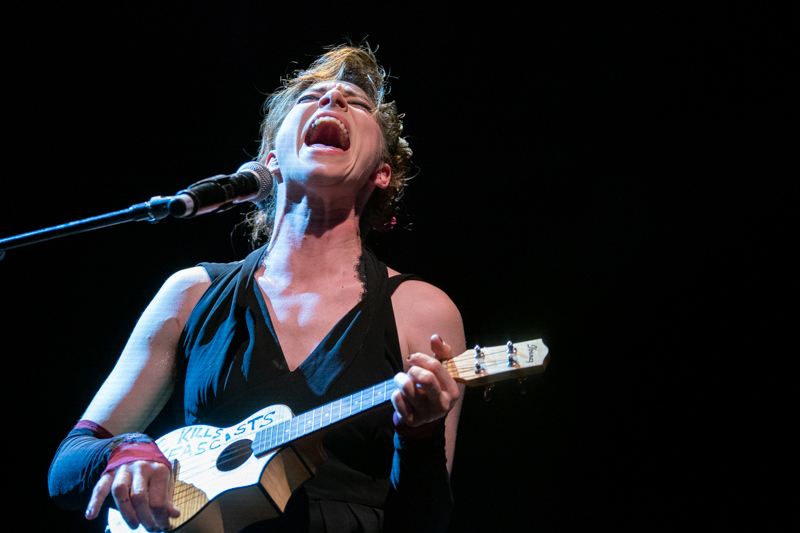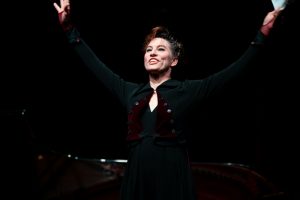REVIEW: Amanda Palmer bares her soul in her one-woman show at the Warfield

Amanda Palmer performs at The Warfield in San Francisco on May 10, 2019. Photos: Gary Chancer.
SAN FRANCISCO — Late in her four-hour show Friday, Amanda Palmer told the story of a yoga teacher who would tell her, “If you can, you must.”
Her instructor was talking about especially difficult poses, but in this era she took it to heart and extended it to other aspects of her life. That included using her platform as an artist to speak about her experiences with abortion, despite how uncomfortable it is for her.
“I don’t really want to be up here, you guys,” she said from the stage. “It’s not that fun.”
She told the audience, like she told RIFF in a recent interview, that her inspirations for her current tour were Hannah Gadsby’s Nanette and Bruce Springsteen’s Broadway show. And the Springsteen influence was obvious in her show’s structure.
Despite the four-hour runtime Palmer played just more than a dozen songs, all completely alone either at a grand piano or, in a couple cases, on a ukulele. Rather than a concert it was more akin to a one-woman theater production with musical interludes, with Palmer spending most of the time telling stories from her life that led to or were happening around the time she wrote the songs.
The first segment told one cohesive story—with a director’s commentary—of her new album, There Will Be No Intermission. Woven around six of the album’s 10 songs, Palmer juxtaposed the stories behind her three abortions with the life of her best friend Anthony, who died of cancer shortly before her son—named Anthony in his honor—was born.
Usually a concert review is expected to go over the setlist and analyze the performance of the songs, but for this show and this style it would be an injustice to those who have yet to see it. The songs serve as continuations of stories, or analysis, or occasionally punchlines. They become a part of the narrative, making any discussion of a setlist essentially a spoiler.
Any analysis of their quality is also misplaced. Not just because it’s unnecessary—Palmer is a brilliant performer with more than a decade of experience—but because the objective quality of the music is secondary to the theme and the emotion of the performance. When she sang into the piano to make the strings resonate, or sat at the edge of the stage playing a ukulele, it was primarily in service of the story.
Just one spoiler of the setlist: She plays two Disney songs in their entirety, both to great comic effect and both so well it may qualify her to be an official Disney princess.
After the intermission—yes, a tour called “There Will Be No Intermission” does include an intermission—she eschews the overarching narrative for a series of semi-independent anecdotes, mostly tied to the remaining songs from the new album but also including a couple songs by her other bands.
The stories were somewhat lighter. Though it does include the story of her miscarriage while alone in a hotel room. On a mountaintop. On Christmas Day. That’s just about as not-light as an anecdote could possibly get. But that led to an uproarious laugh from fans as Palmer broke the tension with a perfectly timed culmination of a running joke few realized had even been happening until the punchline.
In the end, that switch from brutally depressing to hilarious, the dichotomy and duality, is why Amanda Palmer’s show is so powerful and important. Especially now, at the end of a week in which abortion rights are being further restricted in Georgia and Ohio, hearing a human being tell her very human story about her experiences with abortion fills a massive void in the public debate.
The women directly affected by the legislation get lost in the endless battle over abortion, and their stories are all too rare. While we’re constantly presented with one-dimensional views of abortion Palmer’s brutal honesty—her warts-and-all stories of her struggles and decisions, and the nuance with which she injects context and humor—are an extremely important contribution.
Palmer, as she mentioned several times during the show, is a believer in radical compassion to the point it’s gotten her into trouble. Her goal is to empathize with literally everyone. And by telling her story she’s helping others discover their own empathy. Regardless of your beliefs on the subject or even your opinion of her music, she’s achieving what all good art should achieve.
- Amanda Palmer performs at The Warfield in San Francisco on May 10, 2019.
- Amanda Palmer performs at The Warfield in San Francisco on May 10, 2019.
- Amanda Palmer performs at The Warfield in San Francisco on May 10, 2019.
- Amanda Palmer performs at The Warfield in San Francisco on May 10, 2019.
- Amanda Palmer performs at The Warfield in San Francisco on May 10, 2019.
- Amanda Palmer performs at The Warfield in San Francisco on May 10, 2019.
- Amanda Palmer performs at The Warfield in San Francisco on May 10, 2019.
- Amanda Palmer performs at The Warfield in San Francisco on May 10, 2019.
- Amanda Palmer performs at The Warfield in San Francisco on May 10, 2019.
Follow editor Daniel J. Willis at Twitter.com/BayAreaData.













